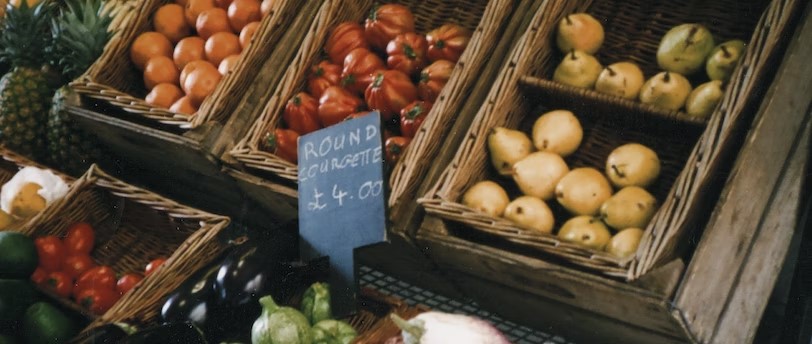Are you often left wondering whether organic foods are truly worth the hype? Do you find yourself questioning if conventional farming methods are as harmful as they’re made out to be? In this article, we aim to debunk the myths surrounding organic and conventional farming practices, while unveiling the truths behind both approaches. By delving into the world of agriculture and examining scientific evidence, we will provide you with a comprehensive understanding of the benefits and drawbacks associated with each method.
Organic farming has gained significant popularity in recent years due to its focus on sustainable practices and avoidance of synthetic chemicals. But what exactly does it entail? Organic farmers prioritize soil health, biodiversity, and natural pest control methods. They refrain from using synthetic pesticides or genetically modified organisms (GMOs), instead relying on crop rotation, composting, and biological pest management. While some argue that these practices result in lower yields compared to conventional farming methods, others believe that organic agriculture promotes long-term environmental sustainability by reducing soil erosion and water pollution.
On the other hand, conventional farming is often criticized for its heavy reliance on chemical fertilizers and pesticides. However, it’s important to note that these criticisms do not necessarily paint an accurate picture of all modern agricultural practices. Conventional farmers employ various techniques to maximize crop production while minimizing environmental impacts. They utilize advanced technologies such as precision irrigation systems and integrated pest management strategies to reduce chemical inputs when possible. It is crucial not to generalize all conventional farms based on outdated perceptions or isolated incidents.
In this article, we will delve deeper into the world of organic and conventional farming practices to separate fact from fiction. Armed with evidence-based information about both approaches, you will be able to make more informed decisions about your food choices – whether you opt for organically grown produce or trust in conventionally farmed products. So join us as we debunk myths and unveil truths about organic versus conventional farming methods!
Key Takeaways
- Organic farming focuses on sustainable practices and avoidance of synthetic chemicals, while conventional farming often relies on chemical fertilizers and pesticides.
- Organic farming prioritizes soil health, biodiversity, and natural pest control methods, while conventional farming utilizes advanced technologies like GMOs and synthetic fertilizers.
- Organic farming reduces environmental impact and pesticide residue on crops, while conventional farming allows for higher crop yields and helps meet the growing demand for food worldwide.
- The choice between organic and conventional farming should be based on personal preferences, values, budget constraints, and access to produce.
Table of Contents

Understanding Organic Farming Practices
Are you curious about what sets organic farming practices apart from conventional methods? Organic farming is a form of sustainable agriculture that focuses on cultivating crops and raising livestock in an environmentally friendly manner. One of the key differences between organic and conventional farming lies in their approach to soil fertility. Organic farmers prioritize building and maintaining healthy soil by using natural fertilizers, such as compost and manure, while conventional farmers often rely on synthetic fertilizers.
Organic farming practices promote sustainable agriculture by implementing techniques that minimize environmental impact. For instance, instead of using chemical pesticides, organic farmers utilize biological pest control methods like crop rotation and companion planting to prevent pests and diseases naturally. They also emphasize conservation practices such as water management strategies to preserve this valuable resource. By adopting these sustainable practices, organic farmers aim to maintain the long-term health of the land they cultivate.
Soil fertility is a crucial aspect of organic farming. Unlike conventional farms that heavily rely on synthetic fertilizers to provide plants with nutrients, organic farmers focus on enhancing soil health through natural means. They use nutrient-rich substances like compost or animal manure, which not only provide essential nutrients but also improve soil structure and water-holding capacity. This emphasis on building healthy soils contributes to better plant growth and reduces the need for external inputs, making organic farming a more self-sustaining method in the long run.
Understanding organic farming practices reveals its commitment to sustainable agriculture and prioritization of soil fertility. By employing techniques that reduce environmental impact and promote natural pest control methods, organic farmers strive to create a harmonious balance between food production and land preservation. Through their emphasis on enhancing soil health using natural sources of nutrients like compost or animal manure, they ensure the long-term sustainability of their farms while providing consumers with nutritious produce grown without synthetic chemicals.
Examining the Use of Pesticides in Organic Farming
Explore the benefits of using fewer pesticides in your farming practices and discover how it can positively impact your crops. Pesticide regulation plays a crucial role in evaluating the effectiveness of organic farming methods. Organic farmers are required to follow strict guidelines when it comes to pesticide use, ensuring that only natural substances are used and limiting their application to specific situations. This approach not only promotes healthier soil and water systems but also reduces the risk of pesticide residue on crops, resulting in safer food for consumers.
When comparing pesticide use in organic and conventional farming, the environmental impact becomes evident. Conventional farming relies heavily on synthetic pesticides, which can have detrimental effects on ecosystems. These chemicals can contaminate waterways, harm beneficial insects, and disrupt the balance of nature. On the other hand, organic farmers focus on integrated pest management techniques that prioritize prevention and biological control methods over chemical intervention. By minimizing pesticide use, organic farming contributes to preserving biodiversity and protecting our environment.
Reducing pesticide reliance in organic farming goes beyond environmental benefits; it also enhances crop quality and safety. With fewer chemicals present in their production process, organic crops often have lower levels of pesticide residue compared to conventionally grown ones. This not only ensures healthier food for consumers but also helps prevent potential health risks associated with long-term exposure to pesticides. Additionally, by utilizing alternative strategies such as crop rotation or companion planting, organic farmers foster resilient ecosystems that naturally combat pests while promoting sustainable agriculture practices.
Examining the use of pesticides in organic farming reveals numerous advantages both for growers and consumers alike. By carefully regulating pesticide usage and emphasizing natural alternatives, organic farmers promote environmentally friendly practices that protect ecosystems from harmful chemical contamination. Furthermore, reduced pesticide reliance leads to safer food options with lower levels of residue for consumers to enjoy while safeguarding against potential health risks associated with prolonged exposure to synthetic pesticides. Overall, embracing a more sustainable approach through reducing pesticide use is a win-win situation benefiting both crops and our environment.
Exploring the Benefits of Organic Foods
Indulge in the natural goodness of organic foods and experience the numerous benefits they bring to your health and well-being. Organic foods are known for their high nutritional value, as they are grown without the use of synthetic fertilizers, pesticides, or genetically modified organisms (GMOs). Studies have shown that organic fruits and vegetables tend to have higher levels of certain nutrients, such as vitamin C, iron, and magnesium. Additionally, organic dairy products and meat have been found to contain higher levels of omega-3 fatty acids.
Not only do organic foods provide superior nutrition, but they also have a positive environmental impact. Organic farming practices prioritize soil health by focusing on crop rotation and using natural fertilizers like compost and manure. This helps maintain soil fertility over time while reducing erosion and water pollution. Furthermore, organic farmers avoid using synthetic pesticides that can harm beneficial insects like bees and butterflies. By choosing organic foods, you are supporting sustainable agricultural practices that promote biodiversity and protect our planet’s delicate ecosystems.
The benefits of organic foods extend beyond personal health and environmental sustainability. Some studies suggest that consuming organic products may reduce exposure to harmful chemicals commonly found in conventional food production. These chemicals include pesticide residues, antibiotics used in animal feed, growth hormones, and artificial additives. By opting for organically produced food options whenever possible, you can minimize your intake of these potentially harmful substances while enjoying the pure taste of nature’s bounty.
Indulging in the natural goodness of organic foods offers a myriad of benefits for your health and well-being. From their superior nutritional value to their positive impact on the environment, choosing organic supports a holistic approach to food consumption. So next time you’re at the grocery store or dining out, consider selecting organically produced options – not just for yourself but also for the future generations who will inherit our planet’s resources.
Debunking Myths about Conventional Farming
Get ready to discover the surprising realities behind conventional farming methods and how they may impact your health and the environment. Contrary to popular belief, conventional farming does have its benefits. One major advantage is that it allows for higher crop yields compared to organic farming. Conventional farmers utilize advanced technologies, such as genetically modified organisms (GMOs) and synthetic fertilizers, which help increase productivity and meet the growing demand for food worldwide. This means more affordable produce on your table.
Another misconception about conventional farming is that it poses a significant risk to human health due to pesticide use. While it’s true that pesticides are used in conventional agriculture, strict regulations are in place to ensure their safe application. Farmers must follow guidelines set by regulatory agencies like the Environmental Protection Agency (EPA) to minimize potential harm. Additionally, rigorous testing is conducted before pesticides are approved for use in order to determine their safety levels for both humans and the environment.
Furthermore, conventional farming plays a crucial role in feeding a rapidly increasing global population. With limited arable land available, adopting organic farming methods exclusively would make it challenging to produce enough food for everyone. Conventional farmers employ efficient irrigation systems and modern machinery that facilitate large-scale production while minimizing resource wastage. This helps ensure food security while also providing jobs and boosting economic growth in rural areas.
There are several benefits associated with conventional farming that often go unnoticed or misunderstood. Higher crop yields, stringent regulations regarding pesticide use, and the ability to meet global food demands are just some of the advantages of this agricultural method. It is important to consider both sides of the organic vs. conventional debate objectively and base our opinions on evidence-based research rather than misconceptions or biases alone
Making Informed Decisions: Choosing Between Organic and Conventional
Consider carefully weighing the advantages and disadvantages of different farming methods to make informed decisions about the food you consume and its impact on your health and the environment. When it comes to choosing between organic and conventional farming, there are several factors to consider. One important consideration is health. While organic produce is often touted as being healthier, there is limited scientific evidence to support this claim. Both organic and conventional farming methods can produce nutritious fruits and vegetables that contribute to a balanced diet.
Another factor to consider when making a decision between organic and conventional farming is the environmental impact. Organic farming practices typically prioritize soil health, biodiversity, and reducing chemical inputs. This can have positive effects on water quality, wildlife habitats, and overall ecosystem health. On the other hand, conventional farming relies more heavily on synthetic fertilizers and pesticides which may have negative impacts on soil quality, water resources, and wildlife populations.
Ultimately, the choice between organic and conventional farming should be based on personal preferences, values, budget constraints, and access to different types of produce. It’s important to note that both methods have their own advantages and disadvantages in terms of health considerations and environmental impact. By considering these factors carefully, you can make an informed decision that aligns with your priorities for your own well-being as well as the well-being of our planet.
Conclusion
In conclusion, when it comes to choosing between organic and conventional farming practices, it is important to separate fact from fiction. Organic farming practices prioritize sustainability and environmental stewardship through the use of natural fertilizers and pest control methods. While some people argue that organic foods are more nutritious, research shows that there is no significant difference in nutritional content between organic and conventionally grown produce.
It is also important to debunk the myths surrounding conventional farming. Contrary to popular belief, conventional farmers do not indiscriminately use pesticides; they follow strict regulations and guidelines set by government agencies to ensure food safety. Additionally, conventional farming has been able to meet the increasing demand for food by employing advanced technologies and crop management techniques.
Ultimately, the choice between organic and conventional foods should be based on personal preferences, budget constraints, and access to different options. Both types of farming have their own advantages and disadvantages, but what matters most is making informed decisions based on reliable information. So whether you choose organic or conventional, remember that a balanced diet rich in fruits, vegetables, whole grains, lean proteins, and healthy fats is key for overall well-being.

